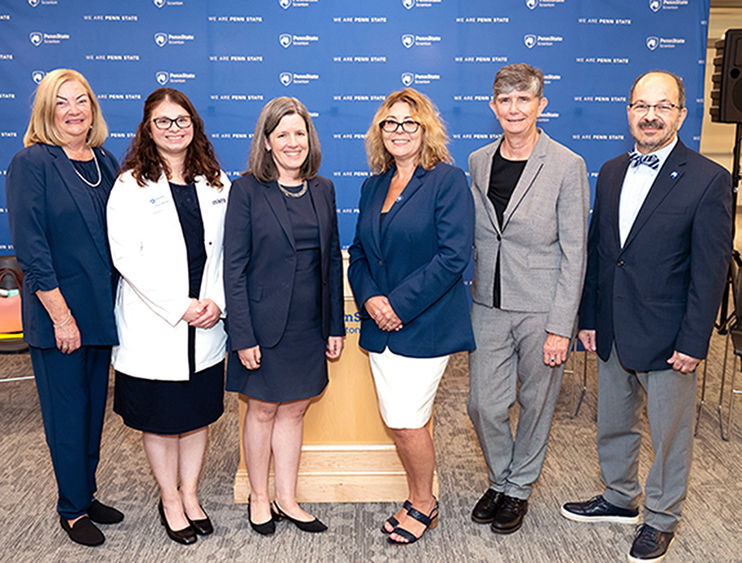
Penn State Scranton held a ribbon-cutting ceremony for its newly renovated Library Building and Nursing Suite on Oct. 2. Keynote speakers at the event included Penn State Ross and Carol Nese College of Nursing Dean Laurie Badzek; Director for Undergraduate Nursing Education at Penn State Scranton Justina Malinak; Northeast Regional Chancellor Elizabeth J. Wright; Vice President for Commonwealth Campuses and Executive Chancellor Margo Dellicarpini; Dean of University Libraries and Scholarly Communications Faye A. Chadwell; and retired Penn State Scranton Chancellor Marwan Wafa.
DUNMORE, Pa. — Penn State Scranton held an official ribbon-cutting ceremony for its newly renovated Library Building and Nursing Suite on Wednesday, Oct. 2. The $13.1 million project, completed this summer, included major changes to both the library and nursing suite spaces and represents a significant commitment by Penn State to education and research, community engagement and nursing education.
Elizabeth Wright, regional chancellor for Penn State Scranton, Hazleton and Wilkes-Barre, presided over the event, along with keynote speakers Margo Dellicarpini, vice president for Commonwealth Campuses and executive chancellor; Laurie Badzek, dean of the Ross and Carol Nese College of Nursing at Penn State; Faye A. Chadwell, dean of University Libraries and Scholarly Communications; retired Penn State Scranton Chancellor Marwan Wafa; Justina Malinak, director for undergraduate nursing education at Penn State Scranton and assistant teaching professor of nursing; and Jemya Wilson, a senior nursing major and president of the Student Nurses Association at the Scranton campus.
“I couldn’t help but think about the significant transformation that has occurred over the last decade in terms of what individuals have come to expect and need from our libraries,” Dellicarpini said. “But the libraries’ importance in supporting student success and faculty scholarship and research remains unchanged. They still fulfill that quiet study space need, but now provide many opportunities for collaboration, study groups and scholarly activities.”
Dellicarpini also highlighted improvements made to the Nursing Suite and nursing students’ commitment to the campus.
“I want to also take a moment to recognize the significance of the nursing program and the investment the University has made in support of its success here at Penn State Scranton,” Dellicarpini said. “Program enrollment is strong, but equally impressive is the community engagement efforts that nursing faculty and students have embraced, such as hosting children’s health fairs; partnering with community organizations to run clothing drives for those in need; offering trainings for first responders, school nurses and visiting nurse associations; hosting vaccination clinics; and the list goes on.”
Badzek talked of the commitment Penn State has made to its nursing degree program not only at Scranton, but across the commonwealth, by investing in the nursing programs and facility improvements at several other campuses and pointed to Penn State’s 98% pass rate for the National Council Licensure Exam (NCLEX), which is significantly higher than the national average.
“The renovations in our nursing department are a game-changer for our education and future careers,” said Jemya Wilson, fourth-year nursing student and president of the Student Nurses Association (SNA) at Scranton. “The enhanced simulation experiences, recording capabilities, realistic supply rooms, and collaborative spaces all work together to create a comprehensive learning environment. We are being equipped not only with the knowledge we need but also the practical skills and confidence to excel in the workforce.”
“Renovated spaces such as the building you're in today demonstrate our sustained commitment to meeting students where they are and helping them to thrive as they strive to meet their personal, educational and professional goals,” Wright said. She also credited Wafa for his vision and work to make the project a reality.
Wafa thanked all the campus staff and individuals who personally worked on the project, and the library staff as well, saying that, “the library is truly the heart of the campus..
Chadwell, who visited the campus in July when the project was nearing completion, expressed her appreciation for all of the library staff members at the campus who worked at maintaining library services during construction despite having a much smaller space to work. During the construction phase, the library was set up in a classroom in the Dawson Building.
Chadwell also acknowledged Wafa for his vision and commitment to transforming these spaces and making them more student-centered, which helps to promote student success by providing robust student engagement opportunities.
The 20,800-square-foot Library Building, constructed in 1970, serves between 250 to 400 students per day, and, in an average semester, students check out and use its textbook reserves more than 1,000 times. Students, staff and faculty also can access resources across Penn State’s entire University Libraries system through the campus library.
The Nursing Suite was established on the ground floor of the building in 1991 when the campus began offering associate nursing degrees. When the bachelor of science in nursing degree was added in 1995, the area was expanded to include classroom, meeting and lab spaces, as well as faculty offices.
The renovation created new entrances on the building’s north and south sides and a lobby inside the library’s main entrance.
New amenities include an instructional computer classroom, maker space with a 3D printer and Cricut machine, computer/printer/scanner area, and anime/graphic novel and best-selling/leisure reading collections. There also are display areas and a variety of private, group and gathering spaces for students to accommodate a variety of study needs.
The Nursing Suite also has a lobby inside its enhanced ADA-accessible entrance, expanded patient simulator and technology labs with computerized patient simulators for a variety of specialty areas, a nurses’ station, conference room, small meeting rooms and learning spaces, and new faculty offices.
The new campus library will serve as a vital resource for Penn State Scranton students, faculty, employees and the surrounding community, providing access to a wealth of knowledge and information, with the new nursing facilities providing cutting-edge educational opportunities for future nurses and the regional medical community.
In just the first few weeks of classes, students in the campus’ nursing program have expressed great enthusiasm and engagement with the newly renovated space.
“With the newly renovated nursing/library building, the nursing community is grateful for the opportunity to continue our dedicated work in preparing the future, next generation of nurses. Infusing nurses into the local community is vital for both public health and the nursing workforce,” Malinak said.
The Penn State Scranton Campus Library's hours of operation are updated regularly.





